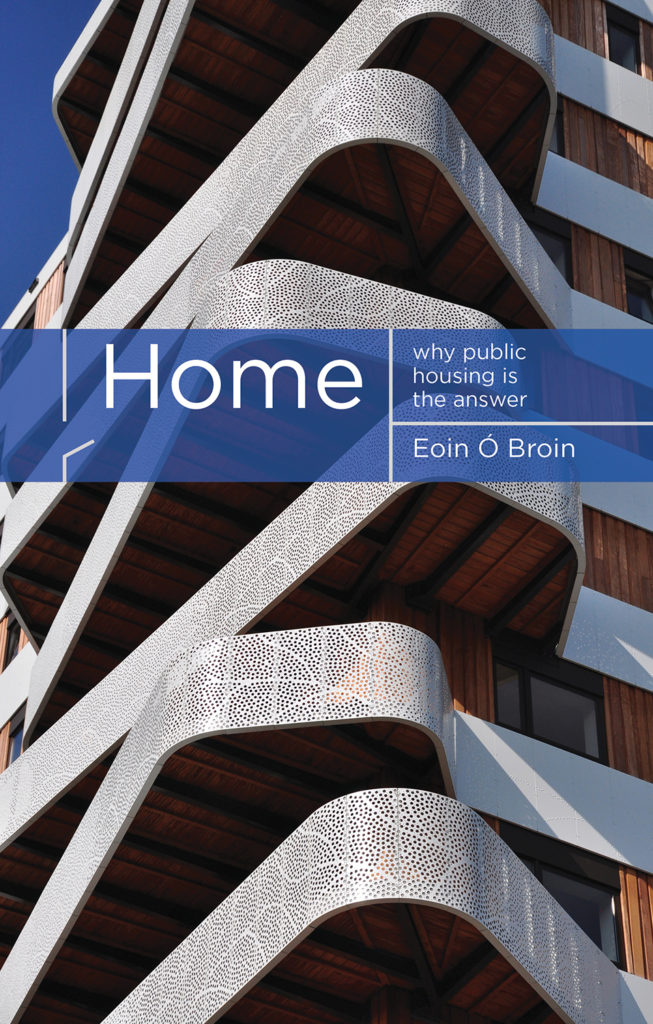HOME: WHY PUBLIC HOUSING IS THE ANSWER
by Eoin Ó Broin | €14.95 | 9781785372650 | 272 pages | Merrion Press |06/05/2019
Extract [Introduction]:
Every day our attention is drawn to housing. Homelessness has reached record highs. Thousands of children are spending years living in unsuitable and overcrowded emergency accommodation. Tens of thousands of people are unable to access appropriate, secure and affordable housing. Rents and house prices continue to rise while an entire generation of young people are locked out of the private market. Social housing delivery is glacial, waiting lists are too long and rent subsidy dependence is growing. The private sector is building too few homes at the wrong price. Accidental landlords are leaving the market and are being replaced by vulture funds.
Increasing numbers of people are affected by and concerned with the failures of our housing system. In newspapers, television shows, casual conversations or arguments in pubs and parliaments, housing is the topic of the moment. But how adequate is the language we are using to describe what is happening around us?
We use the word ‘broken’ suggesting that our housing system once worked but has at some point in its development fragmented into pieces. The word describes something that was badly designed or poorly implemented. But also something that with the right intervention could be put back together again.
More and more we talk of ‘crisis’ as instability, trauma and hardship increasingly come to describe people’s experiences of trying to access secure and affordable accommodation. For some, ‘crisis’ also speaks of a crucial or decisive turning point, a sudden change of course or, in drama, a high point immediately preceding the resolution of a conflict. For others, ‘crisis’ is the inevitable outworking of the cycles of the market economy as boom turns to bust, only to repeat itself endlessly.
In response, reformers ponder how best to ameliorate, but not eradicate, the worst impacts of this unavoidable sequence of events while revolutionaries agitate for some imagined rupture and new beginning. Some prefer the word ‘emergency’ both because it speaks to the immediate risks facing so many people while at the same time demanding urgent attention and greater intervention to get the ‘crisis’ under control. But ‘emergency’ also sounds like an accident that requires you to be rushed to your local hospital. These ‘emergency’ departments never go away, they just see different people on different days with different ‘emergencies’ without end.
Others talk of ‘scandal’, ‘disaster’ or ‘catastrophe’. The first suggests something that offends or causes reputational damage, presumably of those responsible. The second and third imply an unforeseen event, something natural possibly, maybe even on a greater scale than originally imagined.
For me none of these words work. They fail to fully grasp what is going on around us. Housing is not a purely ‘market’ activity and the State, past and present, is intimately involved in every aspect of its financing, building, pricing and allocation. And surely ‘market failure’ is a tautology. Allowing the market too much of a role in the provision of housing is always destined to fail. History, if nothing else, teaches us that.
Housing is a system involving both State and market. There are also non-governmental, academic and media agents whose role is important. And crucially there are real people not just living in, or seeking to live in, but financing, planning, building, pricing, allocating and paying for the places they come to call home.
Our housing system never worked properly. It was never in a fixed or whole state only to be broken and fragmented somewhere along the way. It certainly is in crisis but whether this is a key moment in the creation of something better is not yet clear. And are we really consigned to the Hobson’s choice of an inadequate amelioration or an impossible revolution?
The word I would choose to describe our housing system is dysfunctional. Today in Ireland, and across much of the world, our housing system is completely dysfunctional. It is bad, abnormal and difficult. More importantly these negative experiences for millions of people are the result of abnormal and impaired relationships between the key players in the system. And these are damaging wider social relationships, creating hardship, insecurity, fear and anger.
If you believe, as I do, that good-quality, safe, secure, appropriate and affordable accommodation should be for the many not just the few then understanding the way in which these relationships have become abnormal and impaired during the course of the modern history of housing provision is crucial if solutions are to be found.
Of course words, no matter how descriptive or evocative, cannot fully capture the lived reality of housing stress facing tens of thousands of families and individuals. Every single day, ever-growing numbers of people find accessing secure and affordable accommodation difficult if not impossible. Home is motivated by their stories and is written in an attempt to help solve the problems they face.

Eoin Ó Broin is a TD for Dublin Mid-West and Sinn Féin’s spokesperson on Housing, Planning and Local Government. He is author of Matxinada, Basque Nationalism and Radical Basque Youth Movements (LRB 2003) and Sinn Féin and the Politics of Left Republicanism (Pluto 2009). He is a regular contributor to the Sunday Business Post and An Phoblacht.
Home: Why Public Housing is the Answer is published by Merrion Press (PB, 272pp, RRP €14.95/£13.99).













